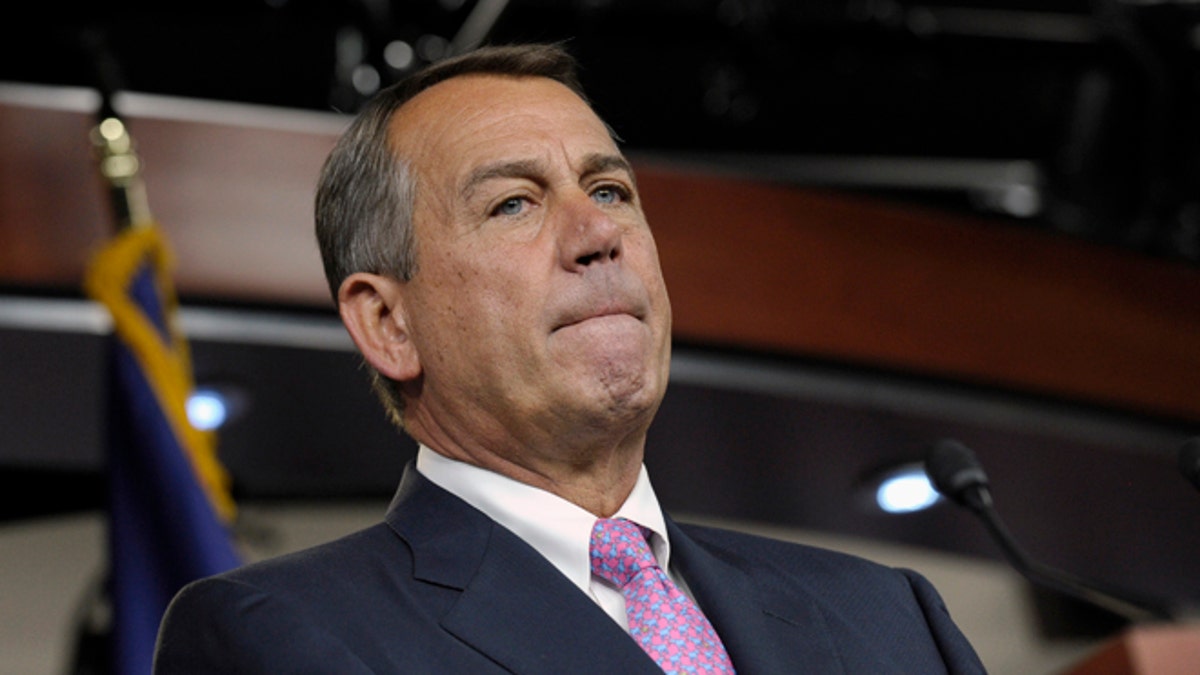
June 27, 2013: House Speaker John Boehner pauses during a news conference on Capitol Hill in Washington. (AP)
House Republicans insisted Sunday that they plan to change key elements of the Senate-passed immigration bill, signaling a protracted and rocky battle ahead despite one Democrat's pronouncement that in the end the House will cave and pass the Senate bill anyway.
Republican Rep. Bob Goodlatte, the chairman of the House Judiciary Committee who is playing a major role in the chamber's consideration of immigration policy, on Sunday addressed what is perhaps at the heart of the impasse.
He said the House, which is drafting its own plan, cannot agree to a path to citizenship for illegal immigrants. Rather, he wants a "pathway to legalization" -- in other words, allow some illegal immigrants a shot at a green card, but not full-fledged citizenship.
The pathway to citizenship, though, is a cornerstone of the Senate-passed bill, and any Democrat-backed plan. Increased border security, better enforcement of businesses and an expansion of the legal immigration system make up the rest of the bill.
Putting the issue in stark terms, Sen. Chuck Schumer, D-N.Y., told "Fox News Sunday" that if Republicans strip the pathway to citizenship, "no Democrat" would support it.
The confrontation over the pathway to citizenship and other planks of the bill could continue to frustrate lawmakers on both sides, and in both chambers, as they try to sustain the momentum from this past week's Senate vote.
The bill passed Thursday with a strong majority of 68 senators voting in favor. Schumer cited the bipartisan support for the bill, as well as the motive of political survival, in claiming that House Speaker John Boehner would ultimately be compelled to pass it.
"I believe that by the end of this year, the House will pass the Senate bill," Schumer said.
House Democratic Leader Nancy Pelosi, speaking on NBC's "Meet the Press," also suggested that Republicans' desire to "win a presidential race" would guide them toward supporting some version of the legislation.
But what's in store for the bill might not be so clear. And there is no easy resolution to the stand-off over the proposed pathway to citizenship.
House Republicans, in the near-term, are approaching the immigration overhaul in a piecemeal fashion, tackling a series of smaller-scale bills meant to address what the Senate covered in one massive piece of legislation.
Rep. Trey Gowdy, R-S.C., also speaking on "Fox News Sunday," rejected Schumer's prediction.
"I was moved almost to the point of tears by Senator Schumer's concern for the future prospects of the Republican Party," Gowdy said, sarcastically. "But we're going to not take his advice."
He added: "The Senate bill is not going to pass in the House. It's not going to pass for myriad reasons."
He, like other House Republicans, questioned Senate promises that their bill would offer legalization to illegal immigrants in the near-term while eventually building border security and immigration enforcement for employers.
Boehner spokesman Michael Steel also told FoxNews.com that the speaker and his caucus have been "perfectly clear" on their intentions.
"The House will not simply take up and pass the Senate bill," he said in an email. "Our legislation will reflect our principles, particularly on border security. Wishful thinking, frankly, is not a strategy for getting a bill to the president's desk."
Schumer methodically made his case Sunday for why he thinks Boehner will, in the end, bring the Senate bill to the floor.
Aside from citing the various political pressures weighing on the speaker, Schumer said the strategy of passing smaller-scale bills would not work. He said, for instance, that Democrats would not support an enforcement bill without the promise of a path to citizenship for illegal immigrants. Factor in Republicans who refuse to support any immigration bill, Schumer said, and those bills cannot pass.
He claimed Boehner would ultimately be left with a choice between doing nothing and bringing the Senate bill to a vote, relying largely on Democrats to pass it.
Goodlatte, though, insisted that Republicans would take a "step-by-step" approach.
Speaking on CNN's "State of the Union," he said "we want to see enforcement improved and actually enforced, and we want to find the appropriate legal status for people who are not here lawfully."
Asked about his opposition to the pathway to citizenship, he explained he didn't want a "special pathway to citizenship, where people who are here unlawfully get something that people who have worked for decades to immigrate lawfully do not have."





















